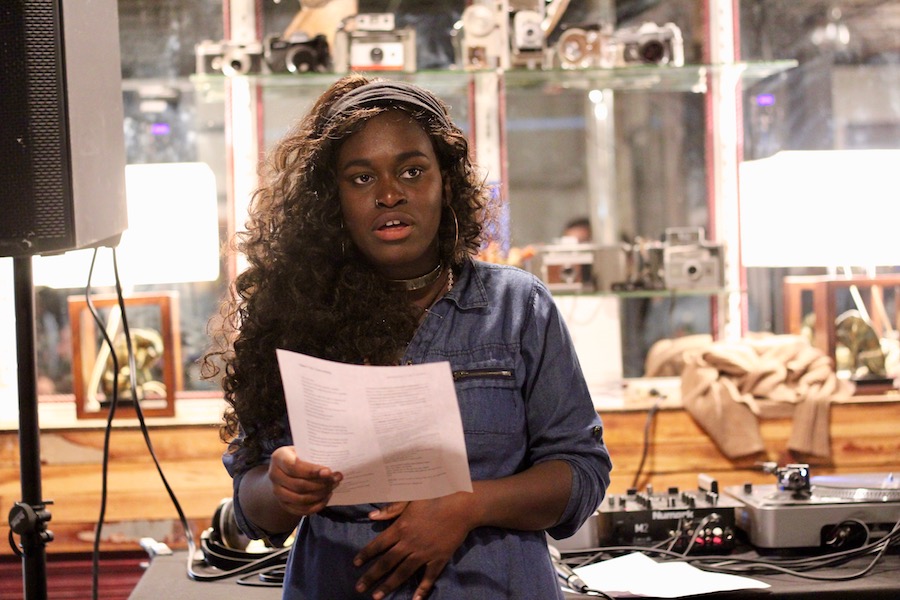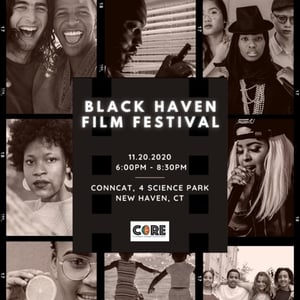Salwa Abdussabur at The State House in August 2019. Lucy Gellman File Photo.
Salwa Abdussabur didn’t see themselves reflected in the artists who were landing grants and paid performances in New Haven. So they decided to flip the script and shift the lens on Black creatives.
That’s the idea behind the first annual Black Haven Film Festival, dedicated to showcasing the work of Black filmmakers from New Haven and across the state. The festival is the brainchild of Abdussabur, an artist and activist who grew up in the city’s Beaver Hills neighborhood, as well as the team at CT Core.
Submissions for the film festival are due Nov. 3, which is also election day. The festival, which will include a screening of 10 short films, is scheduled for Nov. 20 at ConnCAT. All screenings will be COVID-19 safe; this year’s theme is Black stories and Black liberation. A rain date is set for December 4.
“Black Haven is now that time to put the platform out,” Abdussabur said on a recent episode of WNHH Community Radio’s Arts Respond program, in a conversation that spanned racial tensions in Beaver Hills to financial gatekeeping to the city’s long flirtation with the nonprofit industrial complex. “As a person, I’m so privileged to be able to create this platform for artists, Black artists, especially in film, media and theater that’s been long co-opted by racism, long co-opted by misogyny, long co-opted by classism.”
The idea for Black Haven was born earlier this year, after Abdussabur moved back to New Haven from Los Angeles. Last August, the artist went to the West Coast to expand their spoken word career and become a Public Ally, a program that was cut short by the COVID-19 pandemic. When they returned to the city in March, they jumped into virtual and socially distanced community programming, from At Home In New Haven to their biweekly Freshin Up Friday series in Beaver Hills.

Salwa Abdussabur reading their work in 2018 at Lotta Studio. Lucy Gellman File Photo.
Something clicked, they said. In their 22 years in the city, they have lived at the intersections of arts and activism in the city. Months before flying to Los Angeles in August 2019, they spent days protesting the officer-involved shooting of Stephanie Washington and Paul Witherspoon, protesting in New Haven and Hamden sometimes until after midnight.
When they came back to the city this year, they wanted to help facilitate dialogue in their own neighborhood, which has seen rising tensions between hundreds of Orthodox Jewish families and Black residents of the neighborhood.
“I really feel like I need to be here, more than ever, in my city,” they said. “I know it like the back of my hand. I know the politics like the back of my hand. I know what the community needs. I know what we need to push for. And so, it's been really amazing ... I feel there's so much to be done."
Part of that, they added, is creating space by and for Black artists during the parallel pandemics of COVID-19 and structural racism. Well before COVID-19, they watched as arts organizations in New Haven withheld funding from Black artists, or asked artists of color to jump through hoops for small, competitive amounts of money.
They watched as Black and Brown artists were turned against each other for “diversity” grants, sometimes as small as a few hundred dollars. That feeling has intensified during COVID-19, which has affected Black New Haveners at a rate far higher than their white counterparts.

That sense of financial gatekeeping dominated their young adulthood in New Haven, they added. They recalled hearing about a white-led arts collective that didn’t have a mission statement or clear connection to the city, but had already landed $20,000 in grants. In another instance, a close friend struggled to find acting work in the city, but watched as white artists around her flourished.
For years, they and their friends produced art in largely underground networks, working on shoestring budgets when they couldn’t get mainstream support for their work. It wasn’t until recently, for instance, that Abdussabur had reliable access to recording equipment for their own songwriting and production. They said that frustration is part of what led to a new formula for Black Haven.
“I carry that,” they said. “There’s a lot of situations like that. Feeling that for me as a Black artist, I have to have everything, everything, down to the last detail prepared in terms of my resume, experiences. There’s been so many barriers in my artistic, creative process and growth, just due to not being able to have access to the tools.”
“So Black Haven,” they continued. “We need institutions in New Haven who have historically participated in racism—so, all of y’all—and participated in the suppression of Black art, which is so real, and I hear stories from elders who are artists … to commit to abundantly funding Black artists.”
As they built a framework for the festival, they opened it to all Black Connecticut artists in an effort to reach creatives in Hartford, Bridgeport, New London and beyond. They partnered with organizations that are led by Black people, praising CT Core in particular for carving out an affinity space for Black artists and creatives. Then they sat down with artists and asked a question that they wished someone had asked them: “What do you need to make this happen?”
As they review submissions for the festival this month, they said they are thinking about Black Haven as the first chapter of a larger movement towards creative equity in the city, and ultimately in the state. They praised a number of local artists including Stout (“she shows me that I can do this thing”), Paul Bryant Hudson, and “amazing funky white man” Aaron Jafferis, who mentored and then worked alongside Abdussabur in The Word. They also look to artists and activists whose words echo through history, including Dr. Maya Angelou and James Baldwin.
“Artists are lethal to capitalism,” they said. “Artists are lethal to oppression. Artists are outside thinkers. I think about how artists have been targeted in so many ways, because of the power and influence they have. Artists are essential.”
Listen to the full interview above. Follow Salwa Abdussabur at @sweetsummermelanin on Instagram. Find out more about Black Haven, including submission guidelines, here.